Following a research trip Tirana, Albania, I carried on to Skopje, North Macedonia to have a look at the real estate investment market there. I spent about a week in Macedonia’s capital city and met with a few real estate agents, lawyers and local investors.
So is NATO’s newest member’s capital city a worthwhile real estate investment destination?
First, let’s have a look at Macedonia.
North Macedonia is in the heart of the Balkans
Being in the Balkans typically implies natural beauty, affordability and ethnic animosity. Being at the heart of the region, North Macedonia is no exception. It is bordered by Greece, Albania, Kosovo, Serbia, and Bulgaria.
Both Greece and Macedonia lay claim to Alexander the Great. I won’t take sides as I simply don’t know, but the fact remains that these two countries despise each other. As recently as 2019 Macedonia was forced to change its name to “North Macedonia” because Greece believes “Macedonia” is a region within Greece, thus vetoing Macedonia’s NATO accession.
Macedonia emerged as an independent country following the break-up of Yugoslavia, and notably managed to do so without provoking war with Serbia. It peacefully and unilaterally declared independence in 1991.
In 2001, the beginnings of a civil war erupted, with Albanian militias attacking Macedonian institutions and civilians in majority Albanian-majority towns in the name of “Albanian minority rights,” just as they had done in Kosovo. After dozens were killed on both sides, a peace treaty was eventually signed. The two ethnic groups have since co-existed, however uneasily.
The Demographics in North Macedonia
The topic of demography in North Macedonia is complicated and political but cannot be ignored. As a foreign investor, this is one of the “core insights” that you should know about.
By all measures, Macedonia is small. It is country of about 2 million souls, with a steeply declining fertility rate.
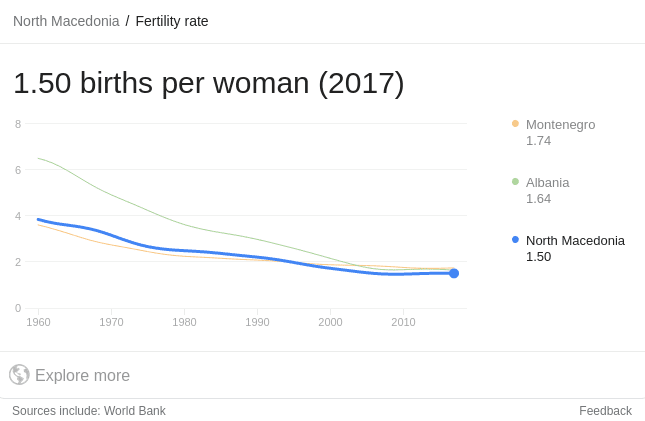
These numbers are based on official statistics, but according to Apostol Simovski, the head of the country’s statistical office, they are completely wrong: “I’m afraid there are no more than 1.5 million in the country, but I can’t prove it.”
The reasons for this are two-fold:
- Barely anyone registers when emigrating. Macedonians are found all over Western Europe, and in Serbia, but people generally don’t register the fact that they have left Macedonia.
- Following the “peace deal,” politicians on both sides had an incentive to boost the numbers of their ethnic kin in the country. A new census is continuously pushed back as it is too politicized. The current official demographic numbers are simply extrapolated from the 2002 census.
The result is that most numbers are wrong, including fertility rates. If the population count is lower, the fertility rate is actually higher because the same amount of births would be allocated to fewer women. It also skews the GDP per capita figures.
In essence, North Macedonia is richer and more dynamic than the numbers suggest, which is apparent when traveling around the country. Macedonia is not run-down, the infrastructure is quite good, and there is a fair bit of industry.
Let’s have a look at a few economic and macro figures. Keep in mind that just as Albania’s figures were made unreliable by the exclusion of the drug trade’s massive economic contributions, North Macedonia’s numbers are unreliable due to its flawed demographic statistics.
The Economy of North Macedonia
The GDP of North Macedonia was gradually expanding until Covid, though not at an impressive rate. During that same period, much wealthier EU countries such as Hungary and Poland were booming.
North Macedonia GDP Annual Growth Rate
source: tradingeconomics.com
Government spending was an important source of this this lackluster growth. The result is that the debt to GDP ratio shot up without much to show for it. Overall, it is still relatively low, though it’s currently increasing dramatically due to COVID.
North Macedonia Debt to GDP ratio
source: tradingeconomics.com
The positive economic reforms in North Macedonia
Previous governments made an effort to reform the post-Yugoslav economy. This is exemplified by Macedonia’s ranking in the “Ease of Doing Business” report by the World Bank.
Ease of Doing Business ranking North Macedonia
source: tradingeconomics.com
Red tape was cut away, and a 10% flat tax was instituted. So nowadays, expect to pay 10% corporate income tax, 10% personal income tax, and 10% on capital gains. Currently, to create a local LLC, you need to invest 5,000 euros of capital, but within the coming months that will change to 1 euro. Also, you can have a local LLC without having to “pay” a manager’s salary, unlike in 9% Montenegro.
The government has been making a sincere effort to reform the economy.
A visible result of such policies has been the boom in exports.
North Macedonia Exports
source: tradingeconomics.com
The type of exports is just as important as the quantity, as it demonstrates the amount of local value-add.
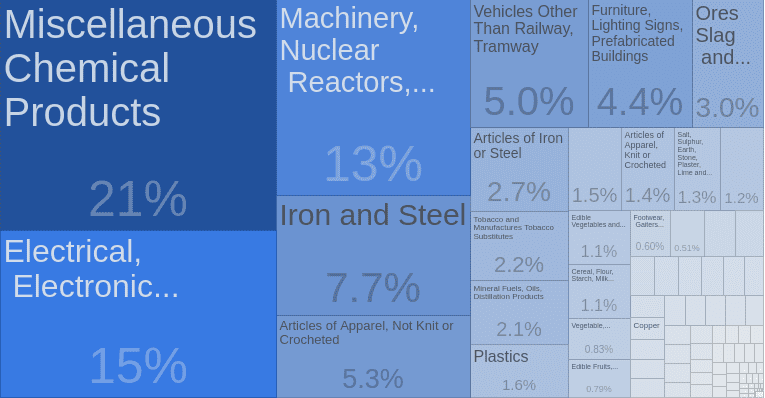
Judging by Macedonia’s geographic location, you would expect most of these exports to go to Serbia, its erstwhile Socialist master, the Greek bully down South, or Bulgaria. But counter-intuitively, almost half of these exports are destined for Germany.
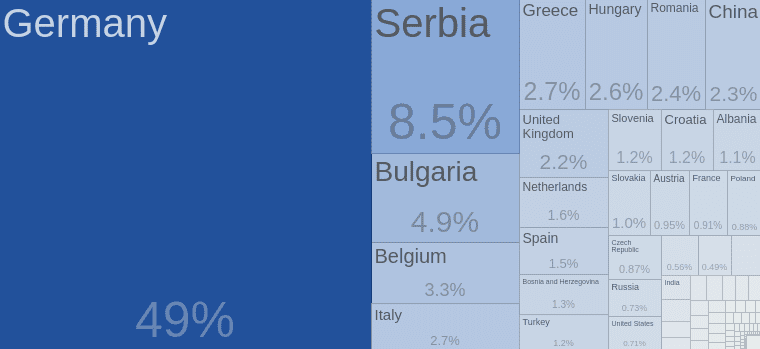
To be fair, North Macedonia feels much richer than its GDP per capita of $5,500 would suggest. When driving around the country, in additional to well-maintained empty homes everywhere (emigrants), one is surprised by the excellent condition of highways, roads and general infrastructure. Also, unlike in other Balkan countries such as Albania, Montenegro and Croatia, there are large, functioning factories everywhere.
North Macedonia is not just some little Balkan tourism play, but an actual productive country that builds things. Economically speaking, it reminds me of Serbia on a smaller scale.
Tourism potential, but not in Skopje
Tourism was doing very well in recent years, with each consecutive year bringing more tourists to North Macedonia.
North Macedonia Tourist Arrivals
source: tradingeconomics.com
This picture I took is the signature Instagrammable view in Macedonia:
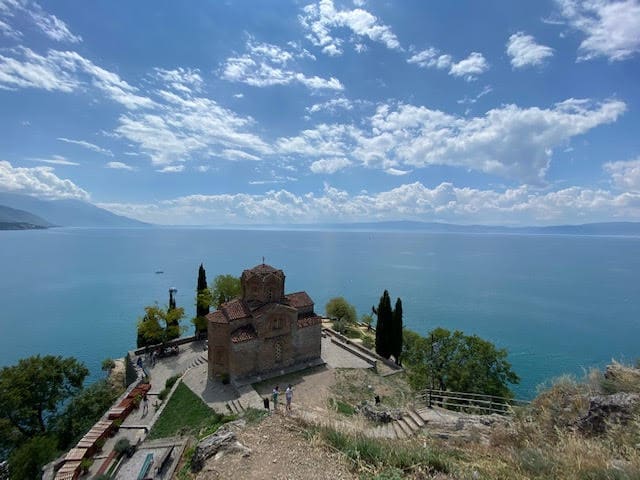
Unfortunately, Lake Ohrid’s tourism potential does not extend to the capital Skopje.
Skopje has been called the Capital of Kitsch by the New York Times and much of the international press. Objectively, except for those who like to view things with irony, there isn’t much to see in Skopje.
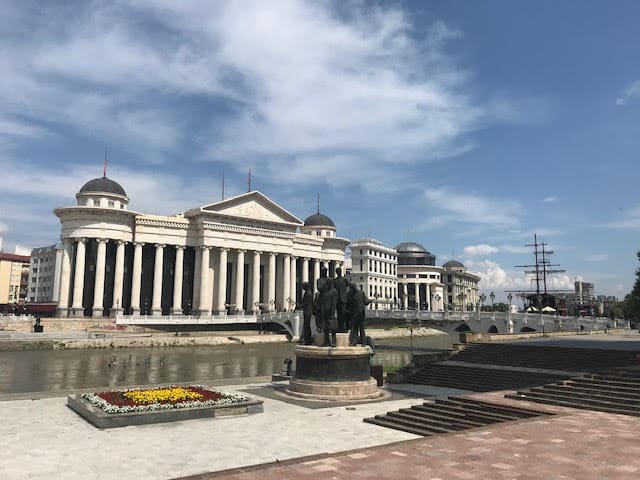
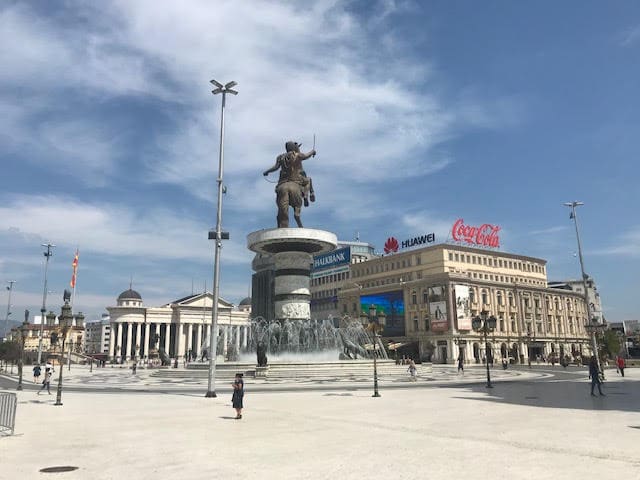
Another factor working against Skopje is the fact that it is known as Europe’s most polluted capital city. You can actually feel it. I was there in August, when much of the people are back in the villages or on the shores of Lake Ohrid, yet the atmosphere was heavy and there was a constant, thin veil of pollution.
The Real Estate Investment Market in Skopje, North Macedonia
While the country as a whole has experienced population decline, Skopje plateaued at around 600,000 inhabitants.
Skopje is one of the few European capital cities, apart from Podgorica in Montenegro, where living in the core center is not particularly desirable.
The center has a few historical buildings that don’t command that much of a premium, and certainly not on the rental market.
Skopje was clearly built with scale in mind – the roads are massive.
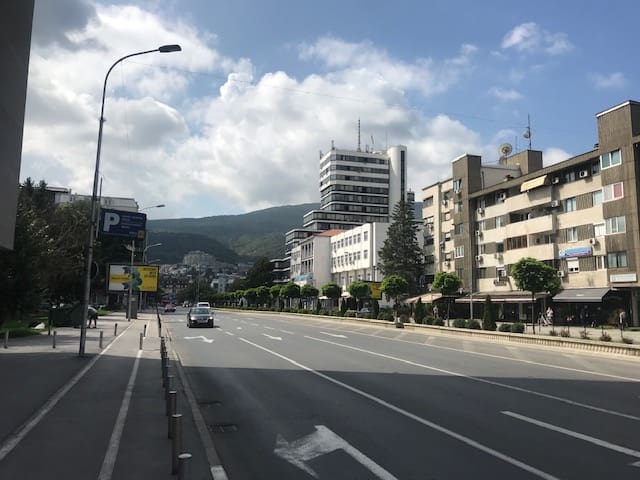
Combined with convenient public transport, these large free-flowing arteries and ample parking space mean that living in the city center doesn’t justify much of a premium. So the m2 pricing of older city apartments is higher, but not the rental prices.
Why live in the city center, when you can live in a leafy suburb, a mere ten minute drive away from all the action?
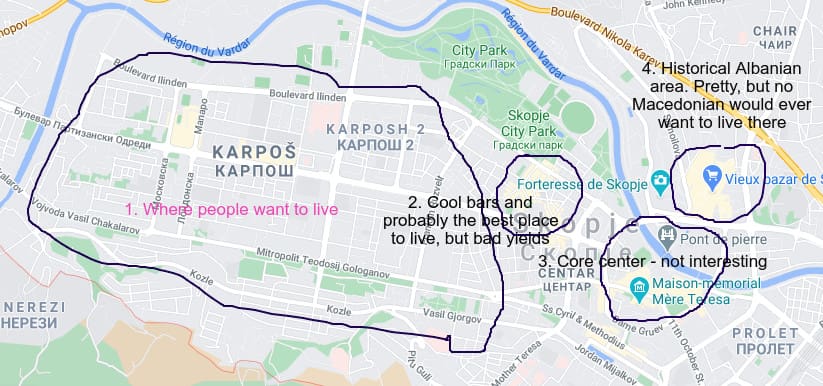
As you can tell from the map, this is not a typical European capital city investment “heat map”. It almost feels like an American city where people want to live in the burbs, but without the violence. Granted, my “where people want to live” is a bit approximate, but it nevertheless gives a good idea of the situation.
Real estate investment examples in Skopje, North Macedonia
The first mistake you want to avoid making when investing in Skopje is targeting foreigners and the expat market. Why? Simply because the city is small, and liquidity will be very low. Good luck finding foreign tenants as there aren’t that many foreigners around.
There are embassies, international organizations, and some foreign companies, but the reality is that this market lacks serious depth.
Rather aim for the local market. This 57m2 one bedroom apartment is exactly what the local market adores.
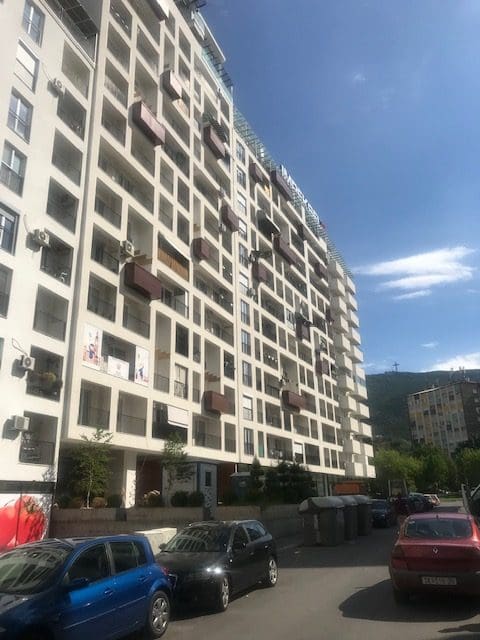
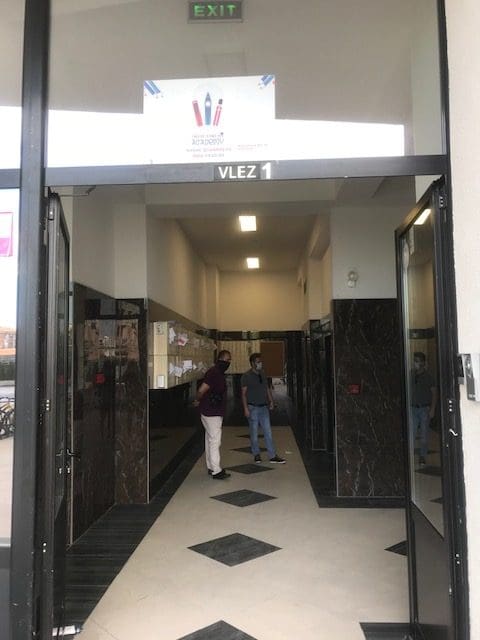
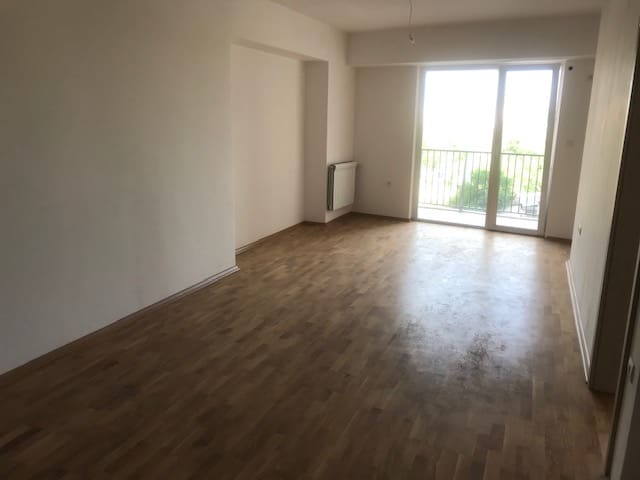
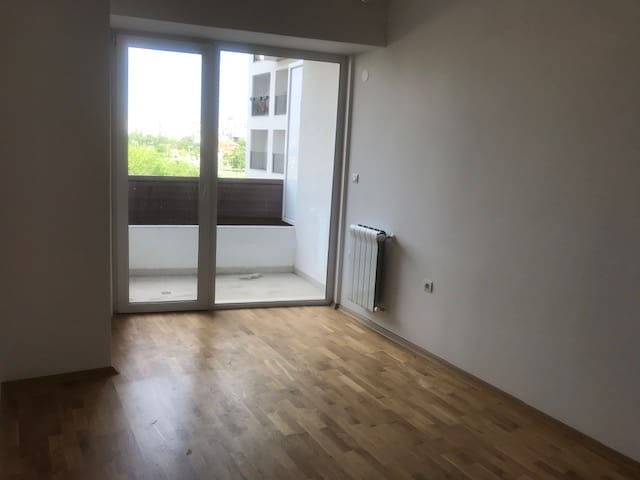
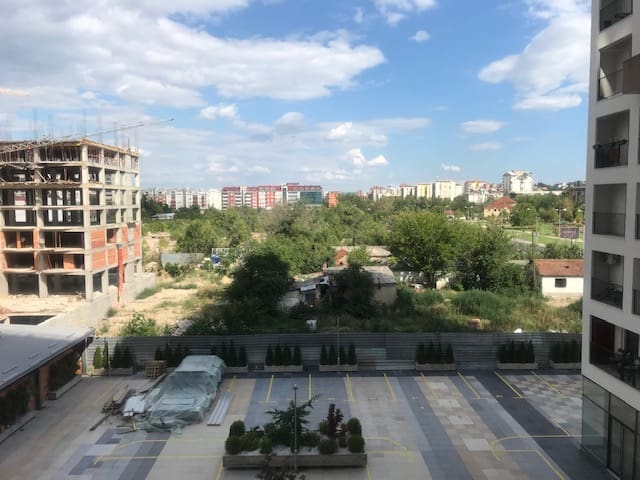
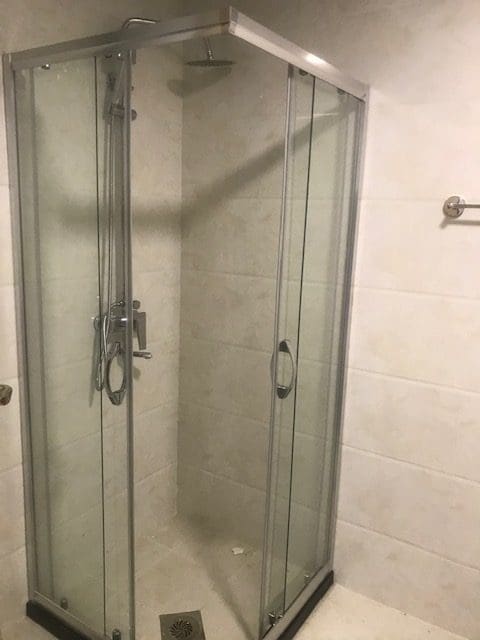
This apartment ticks all the boxes. It’s new, in a nice area down south near the mountain range and is close to shops and schools. There is ample space for parking, and public transport is around the corner. On a Monday morning at 8:30am it’ll take you 15-20 minutes max to get to the office downtown.
It costs €62,700 (€1,100 per m2). Add about €6,000 for finishings, furniture and closing costs
Here is a yield estimate:
| + 1 year rental based on €270 per month | + €3,240 |
| – 10% vacancy | – €324 |
| – Management fees & finders fees 15% | – €486 |
| – Maintenance & various (property tax, etc) 12% | – €389 |
| – Income tax 10% | – €204 |
| Net, net income | + €1,837 |
| Yield on total purchase price of €68,700 | 2.7% |
Just like in Albania, we have another case of very low yields.
I also went to check out a historical building in the core center. This building is around the corner from the main square, where there is a massive statue of Alexander the Great, and it offers a nice view of the Swiss embassy. The apartment is on two stories, is 96m2 big for a total price of €130,000. It is on the third floor without an elevator.
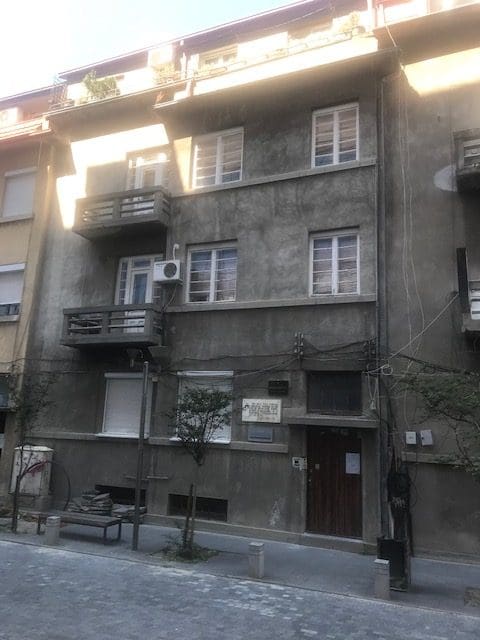
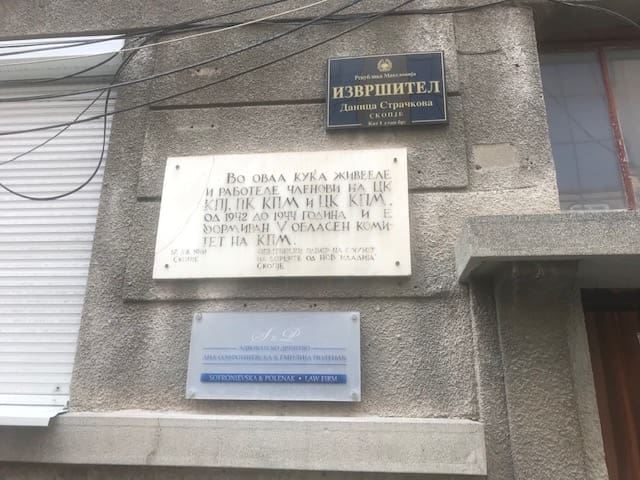
I went to see an apartment on the top floor of 8 Udama Brigada street. I initially posted pictures of the inside of the flat but the owner asked me to remove them for privacy reasons once he found out about this post.
Everything about this apartment was bad; the layout, the feel, and the fact that the second story had been added in the 90s and felt like it was going to fall apart. The whole place would need a revamp worth at least €500 per m2. This + finishings + furniture + closing costs would take this investment close to €1,900 per m2.
Few people actually want to live in this area, and there is no parking because the street was turned into a pedestrian area to protect the surrounding embassies. You’d therefore pay a high m2 price, and get low rental income. I didn’t do the numbers for this apartment, but they would hover closer to 1.5% net yield. Pass.
Why are the yields so poor?
Again, like in many Balkan countries this is a case of too many emigrants investing in real estate back home. Combine this with endless land, and the market has an ever-expanding real estate park.
What I like about Skopje compared to Tirana is that the local market is healthier, and construction is not fueled by drug money. The issue is simply that as new buildings get completed, developers will continue building as long as there is demand for more units. The land is plentiful and the zoning standards are flexible, so large buildings will continue to mushroom.
You can find cheaper buildings and probably slightly better yields, judging by these ads I saw around town.
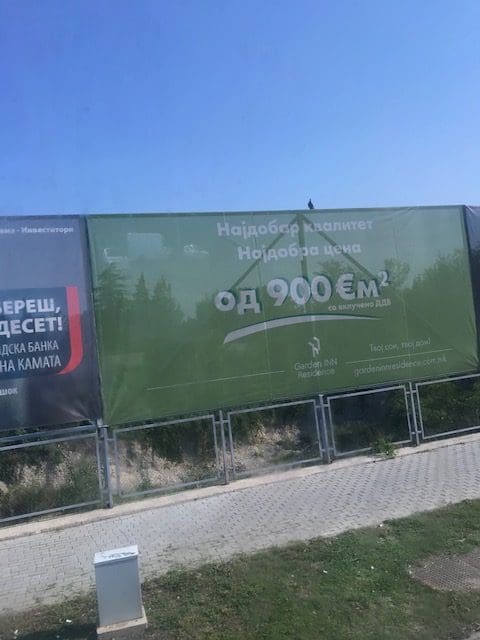
Another difference versus Tirana is the price range. While Tirana had buildings ranging from €500 per m2 to over €2,500 per m2, Skopje is more rational in its pricing and the range is tighter.
I’d also like to add that the building standards were higher than I expected, and certainly much higher than in Tirana, which is important in a seismic zone such as Skopje.
If you are looking for a real estate agent in Skopje, to buy or rent, do get in touch with Miki; he is the best agent I met in Skopje: mikivasilevski@yahoo.com or Viber/phone +389 7024 3104.
Should you make a real estate investment in Skopje, North Macedonia?
Essentially, no. The yields are low, and there are no real prospects for capital appreciation.
However, Macedonia has something unique to offer.
Residency by Investment in North Macedonia
Almost nobody has heard of this scheme as it has been poorly marketed, if at all.
Here’s how it works:
- Buy an apartment worth €40,001 or more anywhere in North Macedonia.
- This entitles anyone and their family to residency rights IF they are from the EU or the OECD
- If you are non EU and non OECD you may still buy real estate in North Macedonia IF there is reciprocity with your country. So for example, South Africans should be able to buy as South Africa allows North Macedonians to buy real estate in SA. That said, the reciprocity clause does not enable buyers to get residency. To get residency, they would have to purchase through a local company.
- Spending over half the year in Macedonia gets you tax residency. However, in reality, as the government doesn’t even know how many people live in the country, they have a hard time counting how many days people spend each year within the border, so it is mostly based on self-declaration at this point. That said, as the country modernizes its IT infrastucture, the tax authorities are likely to start counting properly soon.
- Personal income is taxed at a flat 10%, including capital gains. On paper, worldwide income is taxable, but in practice some local lawyers say that only Macedonian income is taxed. This is definitely NOT tax or legal advice, and this current practice is likely to change soon anyway.
- The alternative is to create a local company. This also entitles you and your family to Macedonian residency.
Essentially, it is a fairly similar residency opportunity to the one in Montenegro. Montenegro is a prettier country, with a lower flat tax (9%) BUT the economy is really, really small (600,000 people in total). Click here for an article on real estate in Montenegro, here to learn how to obtain residency there, and here for why Montenegro is a good plan B.
North Macedonia is a solid alternative for people seeking a plan B in Europe, and is an affordable and low-tax jurisdiction with more of a real internal market and better business infrastructure.
The risk that never gets discussed
If you’ve been reading this blog for a while, you’ll know that I simply don’t have patience for PC statements. So let me say it right here.
“The biggest risk for your investment in North Macedonia is an ethnic civil war fueled by meddling foreign powers” – The Wandering Investor.
Ethnic Slavic, Orthodox, Macedonians are about 60% of the population, and ethnic, mostly Muslim, Albanians are now over 20% of the population. They have nothing in common, except for the land they would both rather keep for themselves.
In 2001 there were the beginnings of a civil war. Albanians now have all the rights they could want. Albanian is an official minority language, there are Albanian schools, and Albanian flags are widely flown.
But the reality remains that the two groups just don’t like each other. And it’s fine. People don’t have to like each other; they just need to tolerate each other.
And tolerate each other they have.
But North Macedonia is at the crossroads of many empires. Turkey and Gulf countries have been sponsoring the building of mosques throughout the country, and Russia, traditionally the protector of Balkan Orthodoxy, has been kicked out (and isn’t happy about it).
North Macedonia humiliated itself to join NATO (successfully this year) by changing its name from Macedonia to North Macedonia, and keeps humiliating itself to join the EU. All it gets in return are old tanks and lectures from Western bureaucrats on corruption and Albanian and Roma rights.
Though people want to join the EU for money, many are angry. It wouldn’t take much for people to again take up arms against one another. Hotheads are easily excitable in the Balkans.
Conclusions on making a real estate investment in Skopje, North Macedonia
I don’t see Skopje as an attractive real estate investment destination, unless you want the residency by investment play in order to lower your taxes or start a new life.
That said, North Macedonia is a pretty little country, with kind people (both Albanian and Macedonian) and amazing salad. Most importantly, the country has good potential for outsourcing or as a manufacturing base.
There is also a citizenship by investment scheme for people who invest at least €400,000 into local businesses, and there is currently talk of lowering the amount to €200,000 in some cases.
North Macedonia is making a lot of the right moves to make itself attractive to foreign capital. I’m all ears and I’m monitoring.
If you want a good lawyer in Skopje, North Macedonia to help you with your real estate purchase, residency by investment, citizenship by investment or to create a local company, feel free to get in touch with me.
I like Macedonia. I’ll be back.
If you want to read more such articles on other real estate markets in the world, go to the bottom of my International Real Estate Services page.
Subscribe to the PRIVATE LIST below to not miss out on future investment posts, and follow me on Instagram, X, LinkedIn, Telegram, Youtube, Facebook, and Rumble.
My favourite brokerage to invest in international stocks is IB. To find out more about this low-fee option with access to plenty of markets, click here.
If you want to discuss your internationalization and diversification plans, book a consulting session or send me an email.



Good article. Very true of the current condition of the real estate market in Skopje. The low return on Real estate investment is based on the fact that its currently the best investment option for the population compared to CDs, deposits (secured up to 30,000 euros only) and the boring Stock market.
Good points. Thank you Vasko.
Wow great read exactly what i wanted to know!
Thanks
You’re welcome. Feel free to sign up to the private list for more such content: https://thewanderinginvestor.com/private-list/
Wtf dude, you’re really biased against Albanians. What happened there?
This is really interesting. Thanks for writing it.
I have been considering whether the country is primed for a self reinvention as the younger generation begins to enter government.
When push comes to shove and the question is ultimately “what is it you want”, I think people are willing to what they have to in order to pursue that thing. Perhaps millennial, gen-Z won’t be so affected in their political and social decision making and more interested, instead, in pursuing a better quality of life?
I’m speaking of course as a speculative westerner interested in them as an investment, not someone truly on-the-ground familiar with the country. Do you think nationalism holds Macedonians back, or that truly the EU is not being fair to them? (or is it a case of both and not mutual exclusivity)
Ethnic tensions in a region where many actors try to meddle makes for an unstable situation. As for the EU, Macedonia doesn’t need the EU. They could create their own independent path like the Serbs have done. So even if the EU were not fair to them, it wouldn’t be much of an excuse.
Blimey! I am impressed by your article. You have obviously done a lot of research. Thank you for sharing.